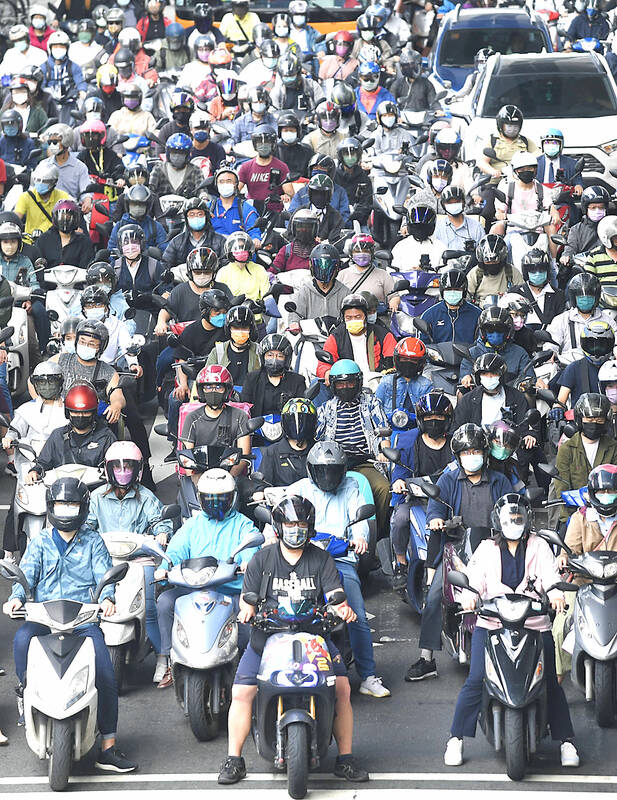Taiwan recorded the sixth-longest average working hours among 39 economies last year, according to a report on international labor by the Ministry of Labor.
The report showed the average annual working hours of people employed in Taiwan stood at 2,008 hours last year, behind Colombia (2,381 hours), Mexico (2,355 hours), Singapore (2,293 hours), Costa Rica (2,242 hours) and Chile (2,026 hours).
Compared with other Asian countries, Taiwan’s annual working hours were shorter than Singapore’s, but longer than South Korea’s 1,904 hours (ranked eighth) and Japan’s 1,626 hours (18th), the ministry data showed.

Photo: CNA
The ministry compiled the data on the 39 economies based on statistics by the Organisation for Economic Co-operation and Development (OECD), International Labour Organization, figures provided by the Labour Force in Singapore report, and other economies.
Taiwan’s average working hours last year increased slightly from 2,000 in 2021, marking the first increase in eight years, the ministry said.
Compared with 2012, Taiwan’s figure fell by 133 hours from 2,141, the ministry added.
The lower 2021 figure came as the local job market was affected by the escalating COVID-19 pandemic, which hurt domestic consumption and resulted in business downsizing in the lodging, and food and beverage industry, along with the retail and wholesale industry, with many firms putting employees on furlough, Huang Wei-chen (黃維琛) director of the ministry’s Department of Labor Standards and Equal Employment said on Saturday.
Last year, due to easing concerns over COVID-19, domestic demand-oriented industries gradually returned to normal, which resulted in an increase in their working hours, Huang said.
Before the increase last year, Taiwan’s average work hours had fallen gradually since 2014, when the figure was 2,135 hours, the ministry’s report showed.
Referring to the nation’s ranking in sixth place last year, Huang said the relatively high figure is caused by the number of people with part-time jobs in the country accounting for 3.5 percent of the workforce.
The US, the largest economy in the world, took ninth place with its average annual work hours hitting 1,822 hours last year, the ministry’s report showed.
Several developed European countries recorded shorter working hours with Germany ranking 39th with average annual working hours of 1,295 hours, following Denmark (38th with 1,360 hours), the Netherlands (37th with 1,361 hours), Austria (36th, with 1,369 hours), Sweden (35th with 1,401 hours) and Norway (34th with 1,409 hours), it added.
The UK ranked 28th with average annual working hours at 1,516, while France took the 33rd spot with 1,427 hours, it said.
The report showed 22.2 percent of Germany’s workforce had part-time jobs, while the ratio in Denmark stood at 18.0 percent and hit 36.8 percent in the Netherlands. Those who had part-time jobs in Japan accounted for 25.1 percent of the workforce, 16.4 percent in South Korea, 11.7 percent in the US and 10.5 percent in Singapore, the report showed.

Alain Robert, known as the "French Spider-Man," praised Alex Honnold as exceptionally well-prepared after the US climber completed a free solo ascent of Taipei 101 yesterday. Robert said Honnold's ascent of the 508m-tall skyscraper in just more than one-and-a-half hours without using safety ropes or equipment was a remarkable achievement. "This is my life," he said in an interview conducted in French, adding that he liked the feeling of being "on the edge of danger." The 63-year-old Frenchman climbed Taipei 101 using ropes in December 2004, taking about four hours to reach the top. On a one-to-10 scale of difficulty, Robert said Taipei 101

A preclearance service to facilitate entry for people traveling to select airports in Japan would be available from Thursday next week to Feb. 25 at Taiwan Taoyuan International Airport, Taoyuan International Airport Corp (TIAC) said on Tuesday. The service was first made available to Taiwanese travelers throughout the winter vacation of 2024 and during the Lunar New Year holiday. In addition to flights to the Japanese cities of Hakodate, Asahikawa, Akita, Sendai, Niigata, Okayama, Takamatsu, Kumamoto and Kagoshima, the service would be available to travelers to Kobe and Oita. The service can be accessed by passengers of 15 flight routes operated by

Taiwanese and US defense groups are collaborating to introduce deployable, semi-autonomous manufacturing systems for drones and components in a boost to the nation’s supply chain resilience. Taiwan’s G-Tech Optroelectronics Corp subsidiary GTOC and the US’ Aerkomm Inc on Friday announced an agreement with fellow US-based Firestorm Lab to adopt the latter’s xCell, a technology featuring 3D printers fitted in 6.1m container units. The systems enable aerial platforms and parts to be produced in high volumes from dispersed nodes capable of rapid redeployment, to minimize the risk of enemy strikes and to meet field requirements, they said. Firestorm chief technology officer Ian Muceus said

MORE FALL: An investigation into one of Xi’s key cronies, part of a broader ‘anti-corruption’ drive, indicates that he might have a deep distrust in the military, an expert said China’s latest military purge underscores systemic risks in its shift from collective leadership to sole rule under Chinese President Xi Jinping (習近平), and could disrupt its chain of command and military capabilities, a national security official said yesterday. If decisionmaking within the Chinese Communist Party has become “irrational” under one-man rule, the Taiwan Strait and the regional situation must be approached with extreme caution, given unforeseen risks, they added. The anonymous official made the remarks as China’s Central Military Commission Vice Chairman Zhang Youxia (張又俠) and Joint Staff Department Chief of Staff Liu Zhenli (劉振立) were reportedly being investigated for suspected “serious